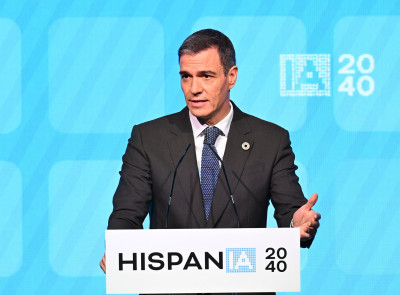
Government President Pedro Sánchez closed the event “HispanIA: how artificial intelligence will improve our future”, held at the Ramón Areces Foundation, Madrid. During his speech, he stressed the need for Europe and Spain to adopt a clear vision of the role of artificial intelligence (AI) in society, defending democracy against the risks of misuse of technologies by major technological corporations.
The event was used to present the study 'HispanIA 2040'. This study is the result of a prospective study conducted by a group of 12 experts under the leadership Oficina Nacional de Prospectiva y Estrategia del Gobierno, with the aim of understanding how AI can increase our future well-being and what decisions we should make to make it that way.
The ‘Hispania 2040’ study analyzes the opportunities and challenges of AI deployment by addressing five major long-term challenges in which AI can play a relevant role in Spain. These five challenges are:
For each of these challenges, the study provides an overview of the main potential applications of AI for which there is empirical evidence, as well as indicators to quantify the starting point of Spain and the possible future impact.
Faced with the five challenges, the study proposes twelve priority lines of action, some of them already addressed in the Estrategia de Inteligencia Artificial 2024:
In his interventions, both Pedro Sánchez and the Minister for Digital Transformation and Public Service, Óscar López, highlighted the good starting point for Spain in relation to AI, also highlighting the progress made with the National AI Strategy.
Pedro Sánchez stressed that Spain that the Executive will continue this legislature strengthening capabilities in digital computing and infrastructure, moving towards "an integrated data system that facilitates its exchange and use among different actors and boosting scientific research and technological development of AI". For this reason, it has announced the publication and availability for all users of the first ALIA models. In addition, he announced that EUR 150 million will be mobilised to enhance the integration and use of AI in Spanish companies, in line with the commitment made in the Artificial Intelligence Strategy. Of these, 20 million will soon be allocated to 500 cases of use in small and medium-sized enterprises, the results and experiences of which will be accessible to all the fabric of SMEs, and "will serve to make them a more innovative and competitive ecosystem".
For his part, Minister for Digital Transformation and the Civil Service, Óscar López, defended the government's commitment to "democratize digital transformation" and reviewed the progress made with the National AI Strategy. Among others, the National Center for Neurotechnologies (Spain Neurotech), with which "great advances" are expected in the treatment of neurological diseases such as Parkinson's, Alzheimer's, depression or sleep disorders, or the location in Spain of one of the seven European factories of AI, thanks to the investment of 62 million from the government, which positions the National Center for Supercomputing as a global reference. In addition, over 600,000 SMEs and self-employed people have received support from the Digital Kit program to digitize and incorporate AI into their businesses.
Since the last legislature, the government has worked with the private sector, civil society and other administrations in this area and has committed in recent years EUR 2 billion to drive the development of high-impact technologies, including AI solutions and their adoption in companies and public institutions. Among others, the Executive has allocated 50 million to finance large research and development projects, 62 million to the creation of the first AI factory in Spain, and another 105 million to facilitate the deployment of this technology in value chains. It has also just committed EUR 500 million for the new semiconductor manufacturing centre in Málaga.

In our News section you will find information about the most relevant events, talks and conferences in the field of artificial intelligence.
For the safe and responsible use of AI in toys,...

The appointment aims to promote a new phase for the...
For safe and responsible use of AI in toys, shopping...
We use third-party cookies for analytical purposes, in summary we only use Google Analytics cookies to analyse our traffic.